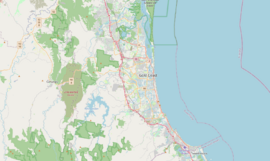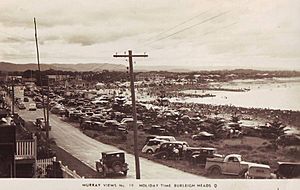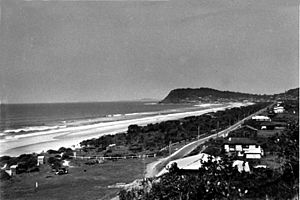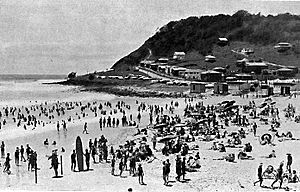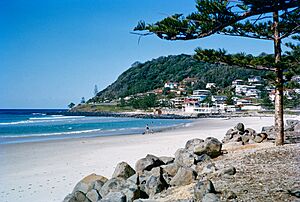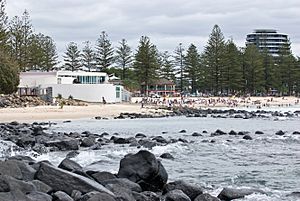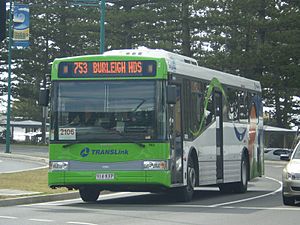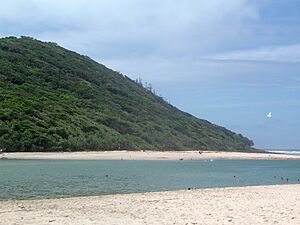Burleigh Heads, Queensland facts for kids
Quick facts for kids Burleigh HeadsGold Coast, Queensland |
|||||||||||||||
|---|---|---|---|---|---|---|---|---|---|---|---|---|---|---|---|
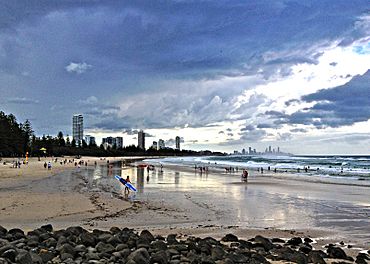
A beach in Burleigh Heads with high rise developments further in the background
|
|||||||||||||||
| Population | 10,572 (2021 census) | ||||||||||||||
| • Density | 1,036/km2 (2,680/sq mi) | ||||||||||||||
| Postcode(s) | 4220 | ||||||||||||||
| Elevation | 9 m (30 ft) | ||||||||||||||
| Area | 10.2 km2 (3.9 sq mi) | ||||||||||||||
| Time zone | AEST (UTC+10:00) | ||||||||||||||
| Location |
|
||||||||||||||
| LGA(s) | Gold Coast City | ||||||||||||||
| State electorate(s) | Burleigh | ||||||||||||||
| Federal Division(s) | McPherson | ||||||||||||||
|
|||||||||||||||
Burleigh Heads is a beautiful coastal suburb located on the Gold Coast in Queensland, Australia. It's known for its stunning beaches and natural areas. In 2021, about 10,572 people lived in Burleigh Heads.
Contents
Exploring Burleigh Heads
Burleigh Head is a special cape, or point of land, that sticks out into the Coral Sea. It's about 80 meters high and is a famous landmark in the area. Burleigh Beach starts at this headland and stretches north.
The suburb has two main parts. The north-eastern part is a narrow strip along the coast, including Burleigh Head. The south-western part reaches further inland along Tallebudgera Creek.
What to See in Burleigh
The heart of the beach area is James Street. Here you'll find lots of cafes, shops, and restaurants. It's a busy and fun place to explore.
Koala Park is a neighborhood in the north-east. It's a residential area next to Tallebudgera Creek. This area is surrounded by beautiful bushland, including Burleigh Head National Park.
West Burleigh is another neighborhood in the south-west. It has its own shopping areas and a small industrial zone.
How Burleigh Heads Was Formed
The land around Burleigh Head was created millions of years ago. Between 20 and 23 million years ago, hot molten lava flowed from Mount Warning. This lava reached the coast and formed the headlands you see today, like Burleigh Head. These ancient lava flows created different types of rocks. These rocks then shaped the landscape, the plants that grew there, and the animals that lived in the area.
Wildlife and Nature
Burleigh Headland is an important natural pathway for animals. It connects coastal forests all the way to the New South Wales border. Burleigh Ridge Park Reserve has many different types of plants and animals because of its unique geology.
Protecting this area has helped save many local plants that Indigenous people used long ago. You can find Eucalypt trees, which are a favorite food for Koalas. Other native animals include flying foxes, gliders, and over 60 different kinds of birds. Before people settled here, the area was covered in dense forests.
A Look Back in Time
For thousands of years before Europeans arrived, Indigenous Australians lived in the Burleigh Heads area. The local tribe was called the Kombumerri clan, and they named this special place 'Jellurgal'.
In 1840, a surveyor named James Warner explored the coastline. He called the headland Burly Head because it looked so big and strong. Over time, the spelling changed to Burleigh Head.
Early Settlement and Growth
The town of Burleigh was officially surveyed in 1871. Land lots were sold starting in 1872. People quickly saw how beautiful Burleigh Heads was, especially its magnificent beach. Many thought it could become the best seaside spot in the region.
By the late 1800s and early 1900s, more buildings like restaurants and guest houses started to appear. This was because more people were interested in visiting the beach for swimming and holidays. Burleigh Heads became a popular spot for beach activities and camping.
In 1903, a railway line opened, connecting Burleigh Heads to other towns. The West Burleigh railway station, originally called Booningba (an Aboriginal name meaning 'place of the echidna'), helped people travel to the area.
Schools and Churches
Burleigh State School first opened its doors in 1917 with just 11 students. It later moved to its current location and was renamed Burleigh Heads State School.
Churches also began to be built in Burleigh Heads. The first Anglican church hall was dedicated in 1926. A Methodist church opened in 1928, and a Presbyterian church followed in the same year. These churches played an important role in the community.
The De Luxe Theatre, a cinema, opened in 1930. It first showed silent movies and later "talkies" (movies with sound). It was a popular place for entertainment, especially during World War II when soldiers were stationed nearby.
The Infant Saviour Catholic Church was opened in 1935. It was designed in a unique Spanish Mission style. This building was later moved to Tamborine Mountain and is now used as a restaurant and reception center.
Modern Development
In the 1960s, the Koala Park residential area was developed. The Burleigh Heads State School grew, and a separate Infants School was opened in 1978, though it later rejoined the main school.
The Methodist and Presbyterian churches in Burleigh Heads joined together in 1972, forming the Burleigh Heads Co-operative Church. This church later became the Burleigh Heads Uniting Church in 1977.
The Burleigh Library opened in 1993 and was updated in 2010.
How People Live Here
In 2021, Burleigh Heads had a population of 10,572 people. The average age was 40 years old. Most people (69.3%) were born in Australia. Other common birthplaces included New Zealand and England. English is the main language spoken here.
Special Places to Visit
Burleigh Heads has several places that are important for their history or beauty. These include:
- Alby Adams Park, with its Rotary Classification Pole.
- The Grave of Emily and Thomas West on George Street Central.
- Burleigh Heads Tourist Park and Caretakers Residence on Goodwin Terrace.
- The former De Luxe Theatre (now The Old Burleigh Theatre Arcade) on Goodwin Terrace.
- Burleigh Heads Library Gardens on Park Avenue.
- Bora Memorial Rock at Jebribillum Bora Park on Sixth Avenue.
- The historic West Burleigh Store on Tallebudgera Creek Road.
- The beautiful Norfolk Island Pines along The Esplanade and Goodwin Terrace.
- The David Fleay Wildlife Park on West Burleigh Road.
Getting Around Burleigh Heads
The Gold Coast Highway runs through Burleigh Heads, connecting it to other coastal suburbs. West Burleigh Road connects the suburb to the Pacific Motorway.
Buses are a common way to travel in Burleigh Heads. The main bus stop is on the Gold Coast Highway. Buses connect Burleigh Heads to places like the Gold Coast Airport, Tweed Heads, Robina, and Broadbeach.
The G:link tram line is being extended from Broadbeach to Burleigh Beach. This project started in July 2022.
Learning in Burleigh Heads
Burleigh Heads State School is a government primary school for students from Early Childhood to Year 6. It's located on the Lower Gold Coast Highway. The school also has a special education program.
There isn't a high school directly in Burleigh Heads. Students usually attend Miami State High School in nearby Miami or Elanora State High School in Elanora.
Catholic primary and secondary education is available at Marymount College in the neighboring suburb of Burleigh Waters.
Community Places
The Gold Coast City Council runs a public library and a public hall called Fradgley Hall in Park Avenue. The library is on the ground floor, and the hall is upstairs.
You can find St John the Evangelist Anglican Church on Park Avenue. The Infant Saviour Catholic Church is also on Park Avenue. The Burleigh Heads Uniting Church is on Burleigh Street.
Sports and Fun Activities
Burleigh Heads is a great place for sports and recreation!
Surfing
Burleigh Heads is famous for its surf break, which attracts surfers from all over. "The Point" at the headland is a popular spot where people gather for barbecues, play cricket, and watch the surfers. On Sunday afternoons, local musicians and fire-twirlers often perform in the park.
Many surfing events are held here, including the Stubbies Surf Classic (which ran from 1977 to 1988), the Quiksilver Pro (sometimes), and the Breaka Burleigh Pro.
Other Sports
| Sport | Club | Venue |
|---|---|---|
| Australian rules football | Burleigh Bombers | Bill Godfrey Oval |
| Basketball | Burleigh Blades | Tallebudgera Recreation Centre |
| Bowls | Burleigh Heads Bowls Club | Memorial Park |
| Boxing | Sanctum Forge Boxing Gym Opetaia Boxing Club |
Kortum Drive Hutchinson Street |
| Brazilian Jiu Jitsu | Gracie Barra Burleigh Heads Full Metal Jiu Jitsu Southside BJJ |
Kortum Drive Ramly Drive Calabro Way |
| Cricket | Burleigh Bullsharks | Bill Godfrey Oval |
| Golf | Burleigh Golf Club | Burleigh Golf Course |
| Muay Thai / Kickboxing | Boonchu Muay Thai Gym | Kortum Drive |
| Rugby league | Burleigh Bears | Pizzey Park |
| Soccer | Burleigh Bulldogs | Pizzey Park |
| Surf lifesaving | Burleigh Heads SLSC North Burleigh SLSC |
Mowbray Park Ed Hardy Park |
| Tennis | Burleigh Heads Tennis Club Gold Coast Albert Tennis Club |
Burleigh Tennis Centre GCA Tennis Centre |
| Field hockey | Hockey Burleigh Club | Ken Hunt Park |
Fun Things to Do
The north-east facing beach at Burleigh Heads is protected by the Burleigh Head cape. This makes it one of the best beaches on the Gold Coast for swimming, bodyboarding, and surfing. A beautiful line of Norfolk Island Pines stands behind the beach. These trees were planted by local families and are home to many native birds.
Other great attractions in Burleigh Heads include:
- David Fleay Wildlife Park: A wonderful place to see Australian wildlife.
- Jebribillum Bora Park: A significant cultural site.
- Burleigh Head National Park: Perfect for walks and enjoying nature.
Local Events
Burleigh Heads State School hosts The Village Markets. This event happens twice a month and showcases local designers and artists.
See also


